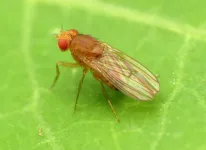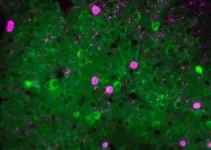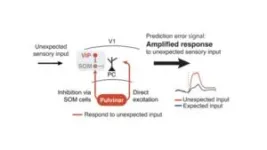(Press-News.org) Male fruit flies will become oblivious to physical danger as they become more engaged in courtship and sex, new research shows.
Researchers at the University of Birmingham have shown that pursuit of a coveted reward – in this case a female fly – will cause a male fruit fly to ignore threats such as predation.
In the study, published today (28 Aug) in Nature, the team was able to show for the first time the neural networks in the fly’s brain that direct this decision-making process, revealing the neurotransmitter dopamine has a leading role to play.
Lead researcher Dr Carolina Rezaval said: “Every day we make decisions that require us to balance opportunities and risk – but we know little about what is happening in our brains as we make these choices.
“By studying the neural pathways that are activated in the brains of fruit flies we can find out more about these processes. As the fly pursues his courtship and is close to mating, we can clearly see that when a threat is introduced, he simply does not see it.”
In their experiment, the researchers used two-photon microscopy to look at which neurons in the fly’s brain were activated during the courtship. The team introduced an artificial threat using light and shadow to simulate the effect of a predator flying nearby.
Dr Laurie Cazale-Debat, a leading researcher in Rezaval’s group at the University of Birmingham, said: “During earlier stages of courtship, we found the presence of threat triggered certain visual neurons in the brain that interfere with neurons governed by serotonin. This prompts flies to abandon their courtship and escape the threat.
“As the courtship advances, however, the increase in dopamine blocks key sensory pathways, reducing the ability of the fly to respond to threat and causing it to focus on mating.”
Dr Rezaval explains: “The animal must decide about what is most important. Dopamine is key to this decision-making process, but the levels of dopamine are closely related to the proximity of the goal – how likely is success?
“You can see this kind of motivation at play all the time among humans. Imagine you’re climbing a mountain and you’re close to the summit,” added Dr Lisa Scheunemann, a group leader from Freie Universität Berlin and key contributor to the study. “If the weather changes and conditions become dangerous you might disregard that threat because you are so close to your goal.”
Dr Rezaval concludes: ‘Our study shows that as courtship progresses, dopamine increases, acting as a sensory filter that blocks distractions and helps the animal focus on the task at hand when close to its goal. We are excited to explore if this is a general decision-making mechanism that is also present in mammals, including humans.”
This work was done in collaboration with Dr Lisa Scheunemann (Freie Universität Berlin), Dr David Owald’s group (Charité - Universitätsmedizin Berlin) and Dr Andrew Lin’s group (University of Sheffield). The research was supported by the Biotechnology and Biological Sciences Research Council, The Leverhulme Trust, Marie Skłodowska-Curie Actions, German Research Foundation (DFG), European Research Council, and Wellcome Trust.
ENDS
PHOTO CAPTION – please credit Konstantin Nechaev/Alamy Stock Photo
• Tropical Fruit Fly Drosophila Diptera
For media enquiries please contact Press Office, University of Birmingham, tel: +44 (0)121 414 2772 or pressoffice@contacts.bham.ac.uk
Notes to editor:
• The University of Birmingham is ranked amongst the world’s top 100 institutions. Its work brings people from across the world to Birmingham, including researchers, teachers and more than 8,000 international students from over 150 countries.
• ‘Mating proximity blinds threat perception’ - Laurie Cazalé-Debat, Lisa Scheunemann, Megan Day, Tania Fernandez-d.V. Alquicira, Anna Dimtsi, Youchong Zhang, Lauren A Blackburn, Charles Ballardini, Katie Greenin-Whitehead, Eric Reynolds, Andrew C Lin, David Owald, and Carolina Rezaval is published in Nature.
• Participating institutions: University of Birmingham, UK; Freie Universität Berlin, Germany; University of Sheffield, UK; and Charité - Universitätsmedizin Berlin, Germany.
END
Love is blind for male fruit flies who will choose sex over safety
2024-08-28
ELSE PRESS RELEASES FROM THIS DATE:
Kidney donors’ risk of death at all-time low
2024-08-28
The risk of death for people who donate a kidney for transplantation — already small a decade ago — has dropped by more than half since then, a new study shows.
Each year, roughly 6,000 Americans volunteer to donate a kidney, according to the Organ Procurement and Transplantation Network. Before undergoing the procedure, donors are informed of the potential risks, including death. Based on data from 1995 through 2009, experts had originally predicted that about three of every 10,000 donors were likely to die within three months of the procedure. The authors of the ...
Thirty-year trends in perioperative mortality risk for living kidney donors
2024-08-28
About The Study: Perioperative mortality after living donation declined substantially in the past decade compared with prior decades, to fewer than 1 event per 10,000 donations. Risk was higher for male donors and donors with a history of hypertension. Current guidelines for donor informed consent, based on 2009 data, should be updated to reflect this information.
Corresponding Author: To contact the corresponding author, Dorry L. Segev, MD, PhD, email dorry.segev@nyulangone.org.
To access the embargoed study: Visit our For The Media website at this link https://media.jamanetwork.com/
(doi:10.1001/jama.2024.14527)
Editor’s Note: Please ...
Intersection of poverty and rurality for early-onset colorectal cancer survival
2024-08-28
About The Study: Patients with early-onset colorectal cancer (defined as colorectal cancer diagnosed in individuals younger than 50 years) living in rural areas had lower 5-year survival rates than their urban dwelling counterparts in this study. While it was not observed consistently for all age groups, persistent poverty in these rural areas may compound this association.
Corresponding Author: To contact the corresponding author, Meng-Han Tsai, PhD, metsai@augusta.edu.
To access the embargoed study: Visit our For The Media website at this link https://media.jamanetwork.com/
(doi:10.1001/jamanetworkopen.2024.30615)
Editor’s Note: Please ...
First-generation antihistamines and seizures in young children
2024-08-28
About The Study: Prescriptions for first-generation antihistamines were associated with a 22.0% higher seizure risk in children, especially in those ages 6 to 24 months in this cohort study. These findings emphasize the need for careful and judicious prescription of first-generation antihistamines in young children and underline the need for further research to elucidate associations between antihistamine prescriptions and seizure risk.
Corresponding Authors: To contact the corresponding authors, email Seonkyeong Rhie, MD, (starclusters@gmail.com) and Man Yong Han, MD, (drmesh@gmail.com).
To ...
Prioritizing the unexpected: New brain mechanism uncovered
2024-08-28
Researchers have discovered how two brain areas, neocortex and thalamus, work together to detect discrepancies between what animals expect from their environment and actual events. These prediction errors are implemented by selective boosting of unexpected sensory information. These findings enhance our understanding of predictive processing in the brain and could offer insights into how brain circuits are altered in autism spectrum disorders (ASDs) and schizophrenia spectrum disorders (SSDs).
The research, published today in Nature, outlines how scientists at the Sainsbury Wellcome Centre at UCL studied mice in a virtual reality ...
More people at risk of hereditary heart disease than thought
2024-08-28
More people in the UK are at risk of a hereditary form of cardiac amyloidosis, a potentially fatal heart condition, than previously thought, according to a new study led by researchers at UCL (University College London) and Queen Mary University of London.
The study, published in JAMA Cardiology, used data from the UK Biobank to analyse the genes of 469,789 people in the UK and found that one in 1,000 possessed genetic variants with a likely link to cardiac transthyretin (ATTR) amyloidosis.
Among ...
Breaking open the AI black box, team finds key chemistry for solar energy and beyond
2024-08-28
CHAMPAIGN, Ill. — Artificial intelligence is a powerful tool for researchers, but with a significant limitation: The inability to explain how it came to its decisions, a problem known as the “AI black box.” By combining AI with automated chemical synthesis and experimental validation, an interdisciplinary team of researchers at the University of Illinois Urbana-Champaign has opened up the black box to find the chemical principles that AI relied on to improve molecules for harvesting solar energy.
The result produced light-harvesting molecules four times more stable than ...
Discovery of how blood clots harm brain and body in COVID-19 points to new therapy
2024-08-28
In a study that reshapes what we know about COVID-19 and its most perplexing symptoms, scientists have discovered that the blood coagulation protein fibrin causes the unusual clotting and inflammation that have become hallmarks of the disease, while also suppressing the body’s ability to clear the virus.
Importantly, the team also identified a new antibody therapy to combat all of these deleterious effects.
Published in Nature, the study by Gladstone Institutes and collaborators overturns the prevailing ...
JAMA review highlights advances in kidney cancer research and care
2024-08-28
CHAPEL HILL, North Carolina — New insights into the biology of kidney cancer, including those informed by scientific discoveries that earned a Nobel Prize, have led to advances in treatment and increased survival rates, according to a review by UNC Lineberger Comprehensive Cancer Center’s William Kim, MD, and Tracy Rose, MD, MPH.
Their observations, drawn from a meta-analysis of 89 studies published between January 2013 and January 2024, were published in JAMA Aug. 28.
“The Nobel Prize in Medicine or Physiology in 2019 was awarded ...
new diabetes research in Scientific Reports links blood glucose levels and voice
2024-08-28
NEW YORK/TORONTO – August 28, 2024 – As part of its ongoing exploration of vocal biomarkers and the role they can play in enhancing health outcomes, Klick Labs published a new study in Scientific Reports today – confirming the link between blood glucose levels and voice pitch and opening the door to future advancements in non-invasive glucose monitoring for people living with Type 2 diabetes.
In “Linear Effects of Glucose Levels on Voice Fundamental Frequency in Type 2 diabetes and Individuals with Normoglycemia,” researchers ...






